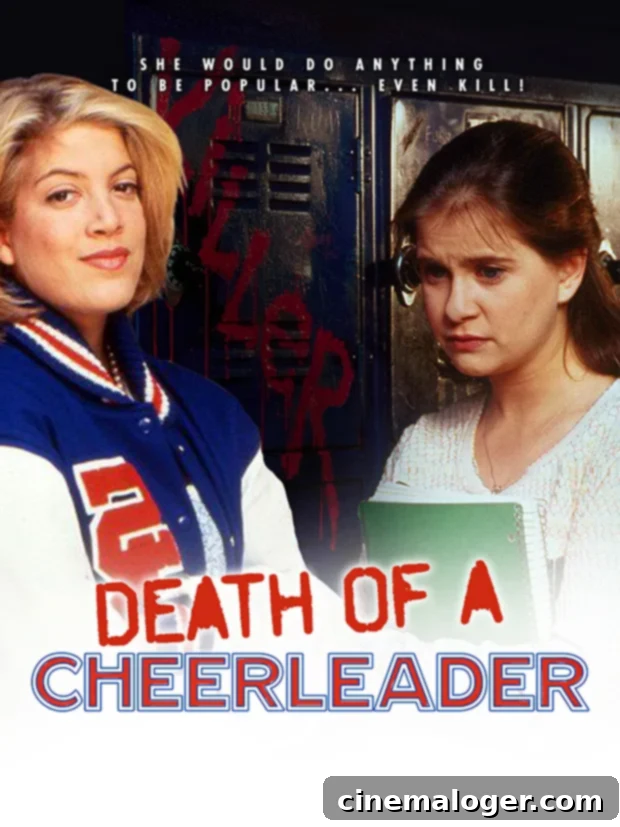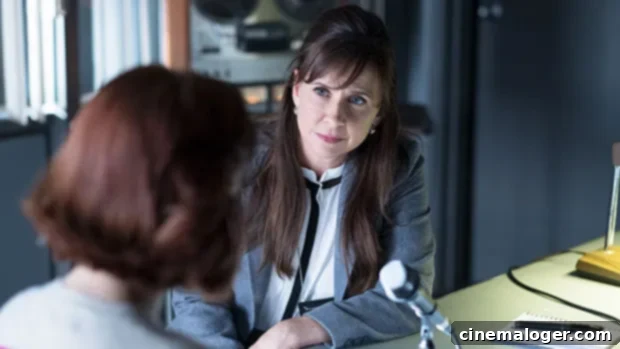Kellie Martin Reflects on Lifetime’s ‘Death of a Cheerleader’: An Iconic Cult Classic Revisited
Kellie Martin has long been a beloved and iconic figure in the landscape of Lifetime movies, captivating audiences with her nuanced performances. In an exclusive interview, the acclaimed actress delved deep into her experiences with both the original 1994 film and the 2019 remake of the cult classic ‘Death of a Cheerleader.’ Martin shared how these pivotal roles not only shaped her career but also profoundly impacted her personal life and perspective.
This summer, Lifetime is commemorating a significant milestone: the 30th anniversary of the Lifetime Original Movie. The celebration kicks off with an ultimate throwback movie weekend, hosted by the charismatic Niecy Nash, scheduled for May 30 and May 31. This special event will pair exciting new premieres with cherished throwback titles from the network’s rich history. Among the most anticipated throwback films is the unforgettable 1994 cult classic, Death of a Cheerleader, which famously starred Kellie Martin and Tori Spelling. Fans can catch this iconic movie on May 30 at 11 a.m., offering a nostalgic journey back to a gripping true-crime narrative that continues to resonate with viewers decades later.
Stepping into Angela’s Shoes: The Original ‘Death of a Cheerleader’ (1994)
During our conversation, Kellie Martin openly discussed the intricate process of filming the original cult classic and her eventual return for a special, transformative role in the 2019 remake. Martin revealed that portraying Angela in Death of a Cheerleader marked her very first acting job after concluding her long-running stint as Becca in the beloved series Life Goes On. This transition presented a unique challenge, as she was determined to portray the real-life story with the respect and gravity it deserved. She shared that after spending four years embodying Becca, taking on a completely different character was a profound shift, offering her a long-awaited opportunity to explore new dimensions as an actress.
Martin expressed a deep sense of empathy for the character she played, Angela, a sentiment she acknowledges might seem “strange” given Angela’s actions. However, her focus was on delving into the psyche of who Angela was before the fateful incident. Playing a character based on a real person added another layer of complexity, making it crucial for Martin to do justice to the story and Angela’s tumultuous path. The dramatic intensity of the role was a significant draw for her. “There was a lot of meat to it. There was a lot for me to do as an actor,” she explained, highlighting the rich emotional and psychological material the script offered.
A Mother’s Evolving Perspective on a Cult Classic
Reflecting on Angela’s character years later, Martin offers a fascinating insight into how her perspective has evolved, particularly after becoming a mother. She notes that as a parent, her understanding of what drives someone to such extreme actions has deepened. “My head as a mom is certainly different now,” she stated, underscoring how personal growth can shift an actor’s connection to past roles. She also pondered the intriguing phenomenon of the 1994 movie achieving cult classic status and its undeniable “element of camp.” While she’s unsure why it developed this quality, she contrasts it with the 2019 remake, which she feels adopted a more “documentary” style, grounding it firmly in reality.
The original, in her view, felt more akin to fiction, almost surreal in its portrayal. This duality between the two versions offers a unique lens through which to re-examine the horrific true events. Martin acknowledges that it was a “horrible thing that happened,” and her role in 1994 was to serve as the “vessel” delivering this poignant story to Lifetime viewers. Looking back, she finds it “odd to play that role,” recognizing the weighty responsibility she carried in bringing such a sensitive narrative to the screen. Her current perspective is clearly informed by both her personal journey and the existence of a modern reinterpretation.
The Full Circle: Returning for the 2019 Remake
When news broke that Lifetime intended to remake the film 25 years after its initial premiere, Kellie Martin wasn’t entirely surprised. She observed the trend of successful shows and movies being revisited and reimagined in recent years, making Lifetime’s decision to revisit Death of a Cheerleader a logical one. She was undeniably “flattered” when she was approached to be part of the new production. Initially, she was offered a couple of different roles, but a specific idea sparked her interest. Martin actively requested to play the FBI agent, a character originally written for a man.
This deliberate choice was driven by a desire to create a meaningful “full-circle moment” for fans of the 1994 version. She envisioned her character as the one to whom the perpetrator would confess, adding a layer of meta-narrative appeal. “I wanted to have that moment,” she emphasized, indicating her intention to deliver an impactful scene that would resonate with long-time viewers. Having been offered two different mother roles, she realized the unique opportunity presented by the FBI agent role. This marked a significant first in her career, as she had never before expressed a desire to play a character specifically written for a man. “That’s never happened to me, so that was fun,” she recounted, highlighting the empowering nature of taking on such a challenging and unconventional part.
The decision to cast a woman as the FBI agent in the remake felt particularly fitting, especially given the inherently female-centric nature of the story. Martin appreciated how the scene ultimately unfolded, noting that her character extracted the confession in a remarkably gentle manner. She pointed out that interrogation scenes are often depicted as aggressive and confrontational. In contrast, her FBI agent chose a more empathetic approach, understanding the vulnerability of the young suspect. “I liked that the FBI agent decided to catch more flies with honey,” Martin said, appreciating the subtle yet effective strategy. She underscored that the perpetrator was “a kid,” not a “hardened 16-year-old criminal,” but rather someone who committed a horrible act, necessitating a delicate and understanding approach to justice.


Timeless Themes: High School Dynamics and The Scars of Bullying
Both the 1994 original and the 2019 remake of Death of a Cheerleader serve as potent explorations of the intricate social hierarchy prevalent in high schools, the devastating impact of bullying, and the complex ways young girls interact with and treat one another. Martin believes the movie continues to resonate profoundly today precisely because these fundamental dynamics within adolescent social structures have remained largely unchanged since 1994. The intense pressures, rivalries, and feelings of exclusion are still very much “alive and well” in contemporary high school environments.
She elaborated on the psychological toll of exclusion: even if the intent isn’t malicious, the person feeling ostracized often allows their imagination to run wild, crafting various reasons for their perceived isolation. This internal struggle is exacerbated by the pervasive influence of social media platforms like Instagram, where one’s self-worth can become inextricably linked to external validation and the opinions of others. Martin argues that this core aspect of human experience, particularly during adolescence, has not evolved. “None of that has changed. That resonates completely today,” she affirmed, highlighting the enduring relevance of the film’s thematic core in a world increasingly dominated by digital interactions.
Behind the Scenes: Challenging Moments on Set
Kellie Martin vividly recalled specific moments during filming that remain etched in her memory, particularly those that pushed her boundaries as an actress. She revealed that the very first scene shot for the 1994 film was the confession to the priest, an astonishing start given its emotional intensity. “I can’t even believe I was able to do that,” she admitted, explaining that performing such a significant monologue before having the chance to fully establish the character was an immense challenge. “That’s like the worst way to start any show is to do the confession before you establish the character at all. That was crazy.”
Another profoundly difficult scene involved the logistics of the knife during the pivotal stabbing sequence with Tori Spelling. The retractable knife, while designed for safety, occasionally presented issues, sometimes sticking slightly. This required Martin to exert “full force” while simultaneously having to “kind of stopped” to avoid causing injury. The technical precision needed to make the act look convincing, coupled with the inherent danger, made it incredibly arduous to film. Emotionally, the scene was harrowing. “It felt so awful,” she recalled, adding that she had never undertaken anything similar in her career. She drew a stark comparison, noting that “shooting someone with a gun, maybe not at close range is not nearly as intimate as stabbing someone.” The raw, visceral nature of that particular act, she concluded, was “pretty trippy” to embody and execute on screen, leaving a lasting impression on her.
Kellie Martin’s Enduring Legacy and Lifetime’s Iconic Storytelling
Kellie Martin’s journey through the “Death of a Cheerleader” saga, from its original cult classic status to her pivotal role in its contemporary remake, encapsulates her profound connection to Lifetime’s unique brand of storytelling. Her thoughtful portrayals, particularly of complex female characters, have cemented her status as a Lifetime icon. Through her work, she has contributed significantly to films that not only entertain but also provoke thought about social issues, adolescent struggles, and the enduring human condition. As Lifetime celebrates three decades of original movies, Kellie Martin’s contributions stand as a testament to the network’s commitment to captivating narratives that resonate across generations, cementing her legacy as an actress who consistently brings depth and authenticity to her roles, making her a vital part of television history.
